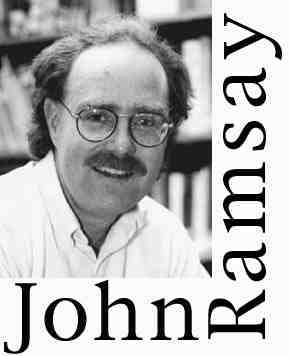
|

|
|

|
| You are here: Campus > LTC > Teaching Tips > John Ramsay |

|

|
|

|

John's Teaching Tip: Bringing the Remote Expert to Class on the Speakerphone
What problem does the tip address?
It has always been a problem for me to teach about the gritty challenges of US urban education while sitting on a lovely bucolic campus with students who have little or no experience in city schools. How to supplement our reading? How to avoid the burden of multiple field trips? How to get students past Hollywood's cartoon pictures of what these schools are like?
What is the tip?
I use speaker phone interviews in class so that my students can speak directly to experts on city schools. This expert might be a teacher, principal, parent, administrator or researcher. In each case, it has been someone we have read or read about. Most recently, my students have interviewed Cedric Jennings, the subject of Ron Suskind's book A Hope in the Unseen.
How is the tip implemented in a classroom setting?
Planning is crucial to the success of a speaker phone conversation.
1) You need to agree with your remote expert on time and length of the phone call.
2) Make sure you know what phone your expert will be at when you place the call.
3) Test the speaker phone and wall jack with Cris Jensen (x5422) in Telecommunications beforehand.
4) Be sure your department knows that it will be billed for the call.
5) Ask students to come to class with at least one question written out.
6) Set up two chairs by the speaker phone, so that you always have one student asking a question and one "on deck."
7) Encourage your students to introduce themselves--name, major, hometown, what they found interesting about the reading-- to the remote expert, so that the expert can have some sense of audience.
8) Place the call, and cross your fingers.
Cautions!
Be ready to jump in, and clarify, translate, or summarize if necessary. Remember: Your remote expert will not have any visual clues as they try to work through the questions. Some experts can get edgy or defensive, and they may need your reassuring voice to know that they are being clear. If they are not being clear, you may have to restate the question, or ask the student to restate the question.
Student Response
Students have overwhelmingly responded that the speaker phone interviews have deepened, extended and enriched their learning. It is about the voice, tone, choice of words, and thoughtfulness that the expert can bring to individual questions. Many of these elements are missing or muted in a reading. Here is a sampling of student responses to our most recent interview with Cedric Jennings:
- "My favorite part is hearing how a person speaks. It reminds me why I go to college instead of just reading the books---because you guys have resources I would never have access to my own...Speaker phone interviews are a wonderful opportunity."
- "I thought it was interesting to see the issues that were important to other people in the class--the things they chose to ask Cedric about."
- "Personally, I was definitely skeptical about how well something like this could possibly work out. To say the least, I was pleasantly surprised. To be able to hear Cedric's voice in my head as I read is incredibly helpful."
- "The interview was a positive use of the class time because it made me internalize the material not solely in an academic sense, but in the sense that the question would affect Cedric personally. This is something that I have never been faced with in an academic setting."
Unsolved Problems/Unanswered Questions:
I'm wondering about the next step. Dare I ask students to line up their own remote experts? Do they have the time, skills, and resourcefulness to organize a speaker phone interview for their classmates? How would I minimize the risks involved in letting students set one of these interviews up with an expert that I did not know? Would the benefits for the students be substantial enough to outweigh the potential problems?
If you have any more questions, or would just like to talk this idea over, feel free to email John Ramsay or call at x 4191.
Last modified: Thursday, May 25th 11:11:05 CST
by: Jennifer Cox Johnson